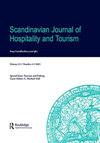Does organic labelling affect restaurant choice? A study on the Danish Organic Cuisine Label
IF 3.6
4区 管理学
Q2 HOSPITALITY, LEISURE, SPORT & TOURISM
Scandinavian Journal of Hospitality and Tourism
Pub Date : 2023-01-01
DOI:10.1080/15022250.2023.2174180
引用次数: 0
Abstract
ABSTRACT Following the growth in the demand for organic food in many Western markets, restaurants are following up by using organic produce in their meal preparation. We conduct a study investigating the role of information on use of organic produce in consumers’ restaurant choice, and the role of a state-certified labelling scheme in this context, using the Danish Organic Cuisine Label (OCL) as an example. We conduct a preparatory focus group study to gain an initial understanding of the role of organic product in restaurant choice and of criteria when choosing restaurants in general. We then conduct a discrete choice experiment investigating the potential role of the use of organic ingredients for consumers’ choice of restaurants, and the role of a certified labelling scheme in such a choice. We find that the role of organics in restaurant choice is limited, as the use of organic ingredients is not linked to the hedonic aspects that consumers are found to put most weight on when selecting a restaurant. The role of the certified label is biggest for a small but very organic-oriented segment. Also, for a price conscious segment, the label was associated with quality, but also with higher prices.有机标签会影响餐厅的选择吗?丹麦有机食品标签研究
随着许多西方市场对有机食品需求的增长,餐馆也开始在他们的膳食准备中使用有机农产品。我们进行了一项研究,调查在消费者的餐馆选择中使用有机农产品的信息的作用,以及在这种情况下国家认证的标签计划的作用,使用丹麦有机烹饪标签(OCL)为例。我们进行了一项预备性的焦点小组研究,以初步了解有机产品在选择餐厅方面的作用,以及一般选择餐厅时的标准。然后,我们进行了一个离散选择实验,调查使用有机成分对消费者选择餐馆的潜在作用,以及认证标签计划在这种选择中的作用。我们发现,有机食品在餐馆选择中的作用是有限的,因为有机食材的使用与消费者在选择餐馆时最看重的享乐方面没有联系。认证标签的作用是最大的一小部分,但非常有机导向。此外,对于价格敏感的细分市场,这个标签与质量有关,但也与较高的价格有关。
本文章由计算机程序翻译,如有差异,请以英文原文为准。
求助全文
约1分钟内获得全文
求助全文
来源期刊
CiteScore
7.90
自引率
8.30%
发文量
14
期刊介绍:
Scandinavian Journal of Hospitality and Tourism is the leading Nordic journal for hospitality and tourism research. SJHT aims at initiating and stimulating high-impact and innovative research relevant for academics and practitioners within the hospitality and tourism industries. The journal takes an interdisciplinary approach including, but not limited to geography, psychology, sociology, history, anthropology, and economics. SJHT encourages research based on a variety of methods, including both qualitative and quantitative approaches. The journal covers all types of articles relevant to the Nordic region, as well as the North Atlantic, North Sea and Baltic regions. We also welcome reviews and conceptual articles with a broader geographical scope that clearly enhance the theoretical development of the hospitality and tourism field. In addition to research articles, we welcome research notes and book reviews. Published articles are the result of anonymous reviews by at least two referees chosen by the editors for their specialist knowledge.

 求助内容:
求助内容: 应助结果提醒方式:
应助结果提醒方式:


